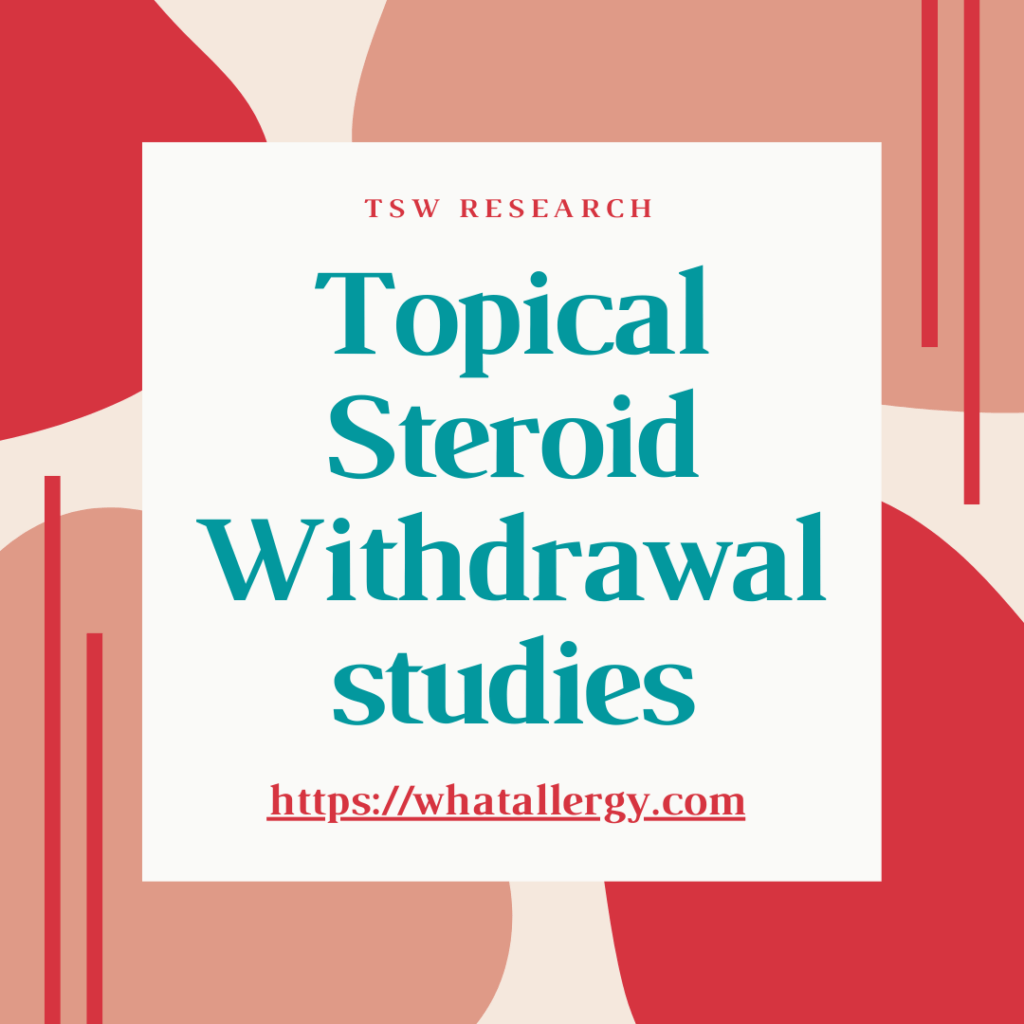What can we learn and what research has been done so far into topical steroid withdrawal? It would be easy to assume there had not been any studies made into this complex condition judging by the lack of medical support and diagnosis pathways.
However as you can see, there have been quite a few, as far back as 1979! and even one in March this year!

Quite a few Topical Steroid Withdrawal Studies
This is a growing list and proves TSW is not new, but not all these studies are well respected and robust. My aim is try to read them all and include below a brief summary of findings, but not all are available to read as they are stuck behind a paywall.
- Adrenal Steroids, their derivatives and Corticotropin. 1950s, Pharmacologic Aspects, Uses, and Contraindications in Dermatology. PAUL HIRSCH, M.D., Philadelphia
- ‘Steroid Addiction’, International Journal of Dermatology, 1979, Albert Kligman and Peter Fosch
- Cutaneous mast cell depletion from topical corticosteroid treatment, J Immunol, 1985 Oct;135(4):2368-73. R M Lavker, N M Schechter
- Corticosteroid addiction and withdrawal in the atopic: the red burning skin syndrome, Clinics in Dermatology Journal, 2003
- Serum nitric oxide levels in red patients – separating corticosteroid -addicted patients from those with chronic eczema’, Jama Dermatology, 2004 by Marvin Rappaport
- Prevalence of atopic diseases and the use of topical corticosteroids – is there a connection?’, Medical Hypotheses, 2005
- ‘Adverse effects of topical glucocorticosteroids’, Journal of the American Academy of Dermatology, 2006, Ulrich Henngge, Thomas Ruzicka, Robert Schwartz, Michael Cork
- The red skin syndromes: corticosteroid addiction and withdrawal‘, Expert Review of Dermatology, 2006, Marvin and Vicki Rapaport
- Topical corticosteroid-induced rosacea-like dermatitis: A clinical study of 110 cases‘, Indian Journal of Dermatology, 2011.
- ‘Side effects of topical steroids’ – a long overdue visit, Indian Dermatology Online Journal, 2014, Arijit Coondoo, Meghna Fiske, Shyam Verma, Koushik Lahin
- Topical steroid addiction in atopic dermatitis‘, Drug, Healthcare and Patient Safety, 2014
- A systematic review of topical corticosteroid withdrawal in patients with atopic dermatitis and other dermatoses‘, American Academy of Dermatology, 2015
- Topical steroid addiction and withdrawal – An overview for GPs‘, Australian Family Physician, Ear, Nose and Throat, 2016
- Steroid Withdrawal Effects Following Long-term Topical Corticosteroid Use’, Dermatitis, 2018
- Topical Steroid Withdrawal: A Case Series of 10 Children. Acta Derm Venereol, Belinda Sheary, 2019
- Traditional Chinese medicine for food allergy and eczema. Ann Allergy Asthma Immunology, Zixi Wang, Zhen-Zhen Wang, Jan Geliebter Raj Tiwari, Xiu-Min Li, 2021 Jun.
- Topical corticosteroid withdrawal (‘steroid addiction’): an update of a systematic review. Jonwei Hwang & Peter A. Lio. Published online: 04 Feb 2021, Journal of Dermatological Treatment.
- Steroid Phobia: Is There a Basis? A Review of Topical Steroid Safety, Addiction and Withdrawal. Sean Yilong Tan, Nisha Suyien Chandran, Ellie Ci-En Choi. Clinical Drug Investigation, Aug 2021
- Topical steroid withdrawal reactions: a review of the evidence. Gov.uk, Sept 2021
- Topical steroid withdrawal through the lens of social media. 2022
- Topical Steroid Withdrawal Syndrome – time to bridge the gap British Journal of Dermatology, Nov 2022. This paper is free to read.
- Topical steroid withdrawal syndrome in a mother and son: A case report, Sage Medical Papers, April 4, 2023
Ref – some older studies found on Eczema Life Resource Page.
I’m working on getting old hold of copies to digest and learn from. What I have gathered from just the abstracts and anecdotal feedback from others is that none of them are peer reviewed, well respected and rigorous enough to gain respect from the industry. And therein lies the problem… what little research has been done is flawed and inadequate, and therefor easily dismissed by dermatologists and the author’s peer group.
TSW Studies from 2015
A systematic review of topical corticosteroid withdrawal (“steroid addiction”) in patients with atopic dermatitis and other dermatoses.
Hajar T, Leshem YA, Hanifin JM, Nedorost ST, Lio PA, Paller AS, Block J, Simpson EL; (the National Eczema Association Task Force).J Am Acad Dermatol. 2015 Mar;72(3):541-549.e2. doi: 10.1016/j.jaad.2014.11.024. Epub 2015 Jan 13.PMID: 25592622
Review. Although many of the side effects of topical corticosteroids (TCS) are addressed in guidelines, TCS addiction is not. …LIMITATIONS: Low quality of evidence, variability in the extent of data, and the lack of studies with rigorous steroid addiction methodology are …
TSW Studies from 2018
Steroid Withdrawal Effects Following Long-term Topical Corticosteroid Use.
Sheary B.Dermatitis. 2018 Jul/Aug;29(4):213-218. doi: 10.1097/DER.0000000000000387.PMID: 29923852BACKGROUND:
Concerns about topicalsteroidwithdrawal (TSW) are leading some patients to cease long-term topical corticosteroid (TCS) therapy. .
TSW studies from 2019
Topical Steroid Withdrawal: A Case Series of 10 Children.
Sheary B.Acta Derm Venereol. 2019 May 1;99(6):551-556. doi: 10.2340/00015555-3144.PMID: 30734047 Free article.
Concerns about topicalsteroidwithdrawal are causing some patients to cease long-term topical corticosteroid therapy, however, little is known about the ensuing clinical outcomes. This qualitative case series studied 10 children whose parents stopped …
TSW Studies from 2021
Topical corticosteroid withdrawal (‘steroid addiction’): an update of a systematic review.
Hwang J, Lio PA.J Dermatolog Treat. 2021 Feb 4:1-6. doi: 10.1080/09546634.2021.1882659. Online ahead of print.PMID: 33499686
BACKGROUND: Topical corticosteroid withdrawal is an entity associated with chronic steroid use and misuse that has not been fully described. …METHODS: We searched Ovid Medline, Pubmed, and Cochrane library for terms related to topical corticosteroid …
Steroid Phobia: Is There a Basis? A Review of Topical Steroid Safety, Addiction and Withdrawal.
Tan SY, Chandran NS, Choi EC.Clin Drug Investig. 2021 Oct;41(10):835-842. doi: 10.1007/s40261-021-01072-z. Epub 2021 Aug 18.PMID: 34409577 Free PMC article.
Review. There is a growing concern amongst patients about topical corticosteroid (TCS) side effects, with increasing discussion of topicalsteroid addiction (TSA) and topicalsteroidwithdrawal (TSW) particularly on social media platforms. …
Topical corticosteroid withdrawal reactions.
[No authors listed]Drug Ther Bull. 2021 Dec;59(12):184. doi: 10.1136/dtb.2021.000062.PMID: 34824131
Overview of: Medicines and Healthcare products Regulatory Agency. Topical corticosteroids: information on the risk of topicalsteroidwithdrawal reactions. …
This study is interesting as it’s the only one looking at possible treatments for the condition, rather that just observing the symptoms.
Traditional Chinese medicine for food allergy and eczema.
Wang Z, Wang ZZ, Geliebter J, Tiwari R, Li XM.Ann Allergy Asthma Immunol. 2021 Jun;126(6):639-654. doi: 10.1016/j.anai.2020.12.002. Epub 2020 Dec 10.PMID: 33310179
Review. Triple TCM therapy including ingestion, bath, and cream markedly improved skin lesion, itching, and sleep loss in patients with corticosteroid dependent, recalcitrant, or topicalsteroidwithdrawal. Xiao Feng San and Japanese and Korean formulas were found to …
TSW studies from 2022
Guys this report just show how much of a difference we are all making by sharing our journey. Not only are we helping each other and getting the word out there, but we also sparked this review by dermatologists. They reported a 288% increase in number of mentions and a 592% increase in performance of #topicalsteroidwithdrawal
I’d love to read this one in full but I don’t have access to read it.
Topical steroid withdrawal through the lens of social media.
Bowe S, Masterson S, Murray G, Haugh I.Clin Exp Dermatol. 2022 Mar 26. doi: 10.1111/ced.15194. Online ahead of print.PMID: 35340034
BACKGROUND: The term topicalsteroidwithdrawal (TSW) describes an adverse effect that generally occurs with inappropriate prolonged use of high-potency topical corticosteroids (TCS). The presence of user-generated content relating to TSW on social media has not been well defined to date.
Results: Across all social media platforms there was a 274% increase in mentions of the hashtag #topicalsteroidwithdrawal in the year 2020(7992) compared with the year 2016(2138). Top associated hashtags included #TSW, #eczema, and #topicalsteroidaddiction. On Instagram, we found a 288% increase in number of mentions and a 592% increase in performance of #topicalsteroidwithdrawal in 2020(618,354) when compared to 2016(89,390).
Conclusion: Our results confirm an increase in the presence of user-generated content relating to TSW on social media and also highlight its extent. Large numbers of patients are exposed to this content which could influence their engagement with TCS.
Further research resources
If you are interested in doing further reading around this subject, check out the following:
- Sasha, a wonderful fellow TSW warrior’s blog – sashibot.com/research where you may also find the articles mentioned above in full.
- My Topical Steroid Withdrawal – Frequently asked questions
- Karen Fischer’s Review of Topical Steroid Withdrawal studies
Studies looking at topical steroid phobia
From an awful study, Corticophobia which I refuse to share a link to because it’s so awful. If you really must read it check out #Corticophobia – the worst article I ever read.
I also won’t link to any of the studies identified in this table, all containing data on content of misinformation related to topical corticosteroids. If you want or read them, go and find them but I don’t want to contribute to reader clicks.
| Findings | Reference |
|---|---|
| TCS phobia is a multidimensional phenomenon and its complexity contributes to the challenges associated with developing effective methods of allaying patients’ fears of TCS. Many seemingly viable approaches, such as presenting data, are ineffective at improving adherence; even interventions that improve patients’ knowledge of TCS fail to mitigate their fear. Those who are more susceptible to pseudo-profound information may be at higher risk of experiencing TCS phobia | Hrin et al., 20223 |
| High rates of messages about TCS ‘risk’ from family/friends and the internet may affect patient/parent understanding about TCS safety, and this may contribute to treatment nonadherence | Smith et al., 201711 |
| Key areas of misinformation related to TCS include red skin syndrome; alternative causes such as diet, chemicals, dust and vaccines; alternative ‘cures’ and alternative ‘natural’ therapies. Some of these theories can be dangerous, especially relating to severe dietary restriction or to potentially deadly treatments. Patients with AD and their families are susceptible to misinformation given their desire for effective treatment | O’Connor and Murphy, 202112 |
| The high prevalence of steroid phobia does not differ based on dermatological condition or severity. Educational videos and demonstrations of topical steroid application are the most effective interventions to lower steroid phobia. Reasons for steroid phobia include misinformation, lack of education, fear of AEs, polypharmacy, negative experience with topical steroids and frequent changing of clinics | Contento et al., 20212 |
| Parents of children with AD confirmed significant concerns and demonstrated poor knowledge regarding TCS use. Steroid phobia and confusing steroid packaging compound poor treatment adherence. This study emphasizes the need for solutions to improve misinformation, hesitancy and steroid phobia, including clear labelling of potency on TCS packaging | Wilson et al., 202113 |
| Friends, family and the Internet are key sources of misinformation about TCS. Patients received conflicting advice from dermatologists, general practitioners and pharmacists regarding TCS application and AEs | Johnson Girard et al., 20201 |
| An interprofessional practice gap exists between dermatologists and pharmacists regarding TCS beliefs and counselling strategies. Collaborative education and improved communication between the two groups may be needed to ensure that patients receive a clear message about TCS | Millard and Stratman, 201914 |
| The most prevalent misinformation sources leading to steroid phobia are the internet and TV or other broadcasting media | Lee et al., 201515 |
Why aren’t doctors and dermatologists reading these studies?
It’s interesting to see studies being done as long ago as 2015, even if these are not as rigorous as required. It would be easy to assume there hadn’t been any studies at all if you spoke to most dermatologists in the UK. Are dermatologists reading them? And if they’re not, why not? Are they printed in unpopular journals?
If there are articles being written to try to disprove TSW, label it a myth and build up a whole conspiracy then it’s not surprising things are hard. Which articles to dermatologists trust?
I will be sending this blog to my dermatologist to read and asking for his feedback. I’d love it if you could all do the same? Let’s love bomb our derms with TSW content.
Even if you don’t have an appointment, your dermatologist or GP will have an email address you can contact them on. If we don’t tell them about this stuff, who else will?
And would any dermatologists like to comment below? We would just all love to talk about TSW with you, more than anything. To just feel seen, understood, heard and respected and to get a diagnosis that we are not going mad would do so much good.
Why is this so hard?
The biggest study of all – Every person going through TSW
I really feel like every one of us going through TSW today are taking part on one huge, massive, horrible experiment. A scientific study with no guidance, no support, no monitoring! So I would urge every dermatologist reading this, don’t just discharge us because we are refusing the immune supressing treatments you are offering, instead engage with us, see what natural treatments you can help with and observe this process with us. Because what if we’re right?
Does your dermatologist diagnose TSW?
I’m looking for dermatologists who are actually diagnosing TSW. Are there any anywhere? Do they exist? And I’m not talking about Dr Rappaport in America charging over $500 for a zoom consultation.
I’d love to hear your feedback on this if you’re an eczema or TSW person. Did you know about these studies? Does it help you feel more understood and give you some hope? Or do we thing these studies are lying unread and dusty in some locked cupboard somewhere?












Leave a Reply